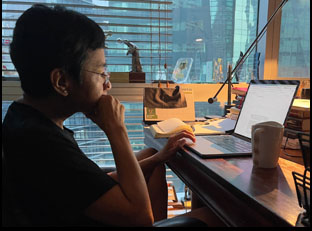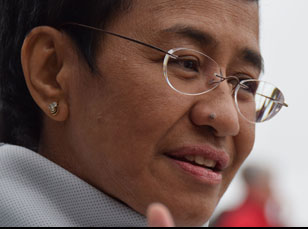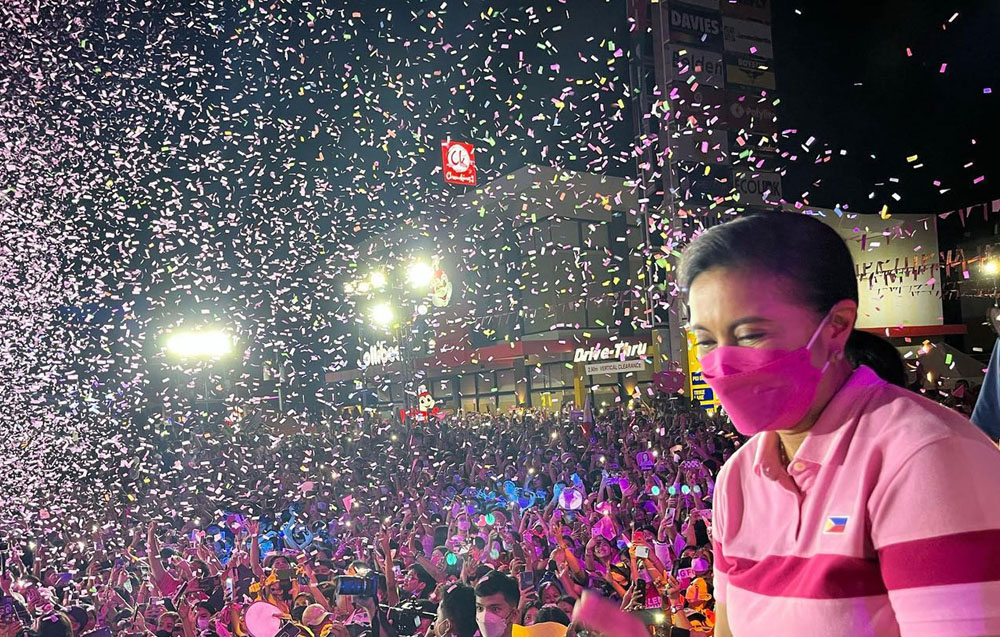Over the years Ramona Diaz has cultivated a rare ability to anticipate the worst to be able to document it, a skill that can range from realizing her native Philippines was tilting towards totalitarian rule under the iron fist of Rodrigo Duterte in her extraordinary 2020 film “A Thousand Cuts” where the president sought to discredit all legitimate reporting on his actions, namely from the online breaking news outlet Rappler, to now joining the publication’s Nobel Prize winning editor-in-chief Maria Ressa on stage at Sundance and helping her avert an entirely different kind of disaster.
“I had brought coffee on the panel because I needed to wake up, and then as I was talking, I knew [Ramona] was going to reach for the coffee to make sure it didn’t fall,” Ressa said of the sixth sense the two of them had developed, shortly after the premiere of Diaz’s latest film “And So It Begins” premiered. “It’s like you just wind up knowing each other.”
Diaz surely hadn’t hoped to make a follow-up to “A Thousand Cuts,” but while the filmmaker was able to bring the world up to speed on the tragic situation unfolding in the Philippines where Duterte’s wars on the free press and purported drug dealers and users have cost thousands of innocent lives when the public can be so easily kept in the dark about the rationale behind them, with his administration deploying a cyber army to manipulate any news about itself and enemies to muddy the waters, she was obligated to stay to see the story through in “And So It Begins,” where she observes the 2022 campaign of Leni Robredo, who seeks the presidency after term limits prevent Duterte from running again. Although Duterte may have to give up his seat in government, the same forces that brought him to power and allowed him to govern with impunity remain and were redirected to support Robredo’s opponent Bongbong Marcos, whose family’s legacy of embezzling wealth from the country would likely be disqualifying before the current era of disinformation.
With Ressa again playing a key role in offering the public real news about the 2022 elections as Marcos can get away without engaging with the press and using unseen surrogates creating fake online stories and imagery to hurt rivals, “And So It Begins” sees Robredo lead a campaign that is both inspiring and somewhat antiquated as she tours the Philippines, decked out in pink and wins over voters the old fashioned way by shaking hands and holding rallies that are part stump speeches and part celebrations complete with cheer squads and musical performances. The positivity is in stark contrast to the images that flood social media about Robredo and while her campaign attempts to combat the lunatic fringe brought out of the woodwork by the Marcos’ campaign’s most spurious attacks with dance flash mobs, the film bears witness to how dangerous this online warfare actually is and how it reshapes the reality around us.
Diaz, once again, has put herself in a remarkable position to chronicle the fallout in real time, bearing witness to both the worst and best impulses of a society as Robredo’s supporters rise up to challenge the disinformation that’s out there and Ressa and the Rappler team continue to report in spite of the threats of violence made against them and “And So It Begins,” in fact, offers an introduction to the entirely new landscape by which elections around the world are bound to operate inside and voters are likely to treat them with more skepticism. While at Sundance, Diaz, Ressa and former Vice President Robredo graciously took the time to talk about having a document of this turning point in Filipino history, the scourge of disinformation and why the trio can be hopeful about the future in the face of heartbreaking setbacks.

Ramona Diaz: I just always roll with the punches. [laughs] And I like filming unfolding lives, so I always get drawn to what I get drawn to out in the field, and I’m always open to changing the story as I go along. I listen to my gut a lot, and I’ve also done this so much, I find that rewards me in the end.
Leni, when you know there’s a film that’s being made about you, was there anything that was important to convey?
Leni Robredo: I told Ramona yesterday that we were a little hesitant about it at first because we were a very small team [as a campaign]. We were not sure if we wanted the scrutiny that went with it. But I am glad that we allowed Ramona to stalk us because we were able to come up with a very important and valuable film that was able to link “A Thousand Cuts” to how we are progressing as far as the fight for disinformation is concerned.
Ramona Diaz: And really in this film, what everything Maria was talking about [in “A Thousand Cuts”] was unfolding in real time, so it just shows this is really true. It’s not just something Maria Ressa is saying. Beyond data, this is what’s happening, and Maria can speak more about the disinformation part of it.
Maria Ressa: Leni had the most attacks, like really truly targeted because the end goal was to really knock her out in 2016 all the way until the next elections. And the irony of course, is even after the May 2022 elections, the attacks against her continue. They’ve slowed down a little bit against me. What did I learn from it? It doesn’t stop, it only gets worse, right? You can’t ignore it. It changes reality.
And for the audience, it’s happening to you, especially for America. In many ways, it’s that quote from the Russian KGB chair, Yuri Andropov, who said, “Disinformacia is like cocaine. You take it once or twice, you’re okay. But if you take it all the time, you’re a changed person.” I think that’s what we’re seeing. Part of the reason the world is so polarized is you can’t tell fact from fiction. Of course, for me, it’s always about big tech, because that is the beginning of the cascading failures, but from Leni’s story, you can see that you can try. Doing the right thing is not enough in today’s world, but somehow you still keep going and if we cannot turn this upside, right side up, I don’t think democracy will survive this year, so this is a cautionary tale for the rest of the world.

Maria Ressa: Ramona was around at the worst of times, and part of the reason was really, it gave us added protection. I was hoping people remain more civilized when a camera is on and also have a record. We’re living through these transformative times and who knows what the world is gonna become? It’s certainly gotten significantly worse for the rest of the world since 2020, and strangely, even though we now have a Marcos in power, the fear in the Philippines has lifted slightly and we must remain optimistic.
Ramona, what’s it like being an intermediary of sorts for your subjects?
Ramona Diaz: Gosh, it was really a privilege, right? Because what both these incredible women have allowed me to do is really take a front seat and observe their lives against the backdrop of a very important history. And I always say the backdrop is a history, but the foreground are lives lived in the everyday, [which is] history when you really think about it. How do people act in the moment of importance? That will be for the record. So it’s always a privilege, and I’m always surprised that they let me do it, and thankful because really without the Vice President and without Maria, there would be no film, right? I’m really persistent, and I always say, “No is maybe, and maybe will might turn into a yes.” But I’m just thankful that they said yes, and I feel it’s important to gain trust because without trust in the room, then the film won’t get made. I’m not a journalist, and I’m not even reality television, I’m not there to find the a-ha moment. I really want to figure out what makes them tick.
Leni, when you’re able to reflect back on the experience, was it interesting to see everything that was going on around you when you were right in the middle of it?
Leni Robredo: The campaign was almost two years ago. We started October of 2021. And [the movie] brought back a lot of memories from the campaign. It was a roller coaster ride for all of us because Ramona was there since day one [from when] I made the decision [to run]. Watching the film all over again brought back all the difficulties and all the joyous moments brought by the campaign, and even if the result was not what we hoped for, watching the movie, I can only feel a sense of gratitude for everything that has happened because we were not expecting a lot from the campaign given the circumstances that we were in when we made the decision. But viewing all the footage, we can only thank everyone for pitching in. It was really a people’s movement and it just assures us that we were able to accomplish a lot during the campaign and there’s so much that we can build on in the years to come.
One of the strongest subjects in the film becomes Anton Carranza, the volunteer leading the social media on Leni’s campaign. Why was it like to follow him?
Ramona Diaz: Anton was a surprise. You approach someone thinking you’re going to get one thing, and then it opens up a whole world just because he was so very articulate about what was happening to him personally, and I asked to film him because he was part of the digital warriors for the campaign, trying to fight disinformation and the propaganda machine of the other candidate, which was formidable because they had started like years ago, so he had a really big job. But I always feel there’s always one person in the film that speaks for me, and I think he spoke to the sentiments of [many], especially at the end when he is frustrated and says, “It’s hard to love this country sometimes,” but then he comes back at the end and [says] “I’m going continue doing it for the youth because it’s for the youth.”
Leni, you say in the film that you regret not fighting back sooner on the disinformation campaign when you clearly wanted to take the high road. What was it like to realize it was a real issue that needed to be confronted?
Leni Robredo: Actually, I had a lot of regrets about the way we responded. If I had a greater appreciation of how evil this information was, I would have responded differently. I was too naive in 2016, thinking that it will go away because all they were saying were lies. So I took the high road. I was telling my staff that we don’t engage, let’s just focus on the work that we’re doing. But two or three years from 2016, we realized that we were not providing the public with the alternate narrative, so when we tried responding, we realized that fact-checking was not enough anymore because of how social media works. Social media is based on algorithms. And by the time that we were trying to correct all the lies against me, it was too late. Our echo chambers were the only ones that were viewing our fact-checking efforts. So we regret that we were not able to respond to all the lies very effectively, but despite the earlier mistakes, we decided to exert a lot of effort catching up. In a way, we were unsuccessful, but we tried doing that because we did not have any other option.
Ramona Diaz: And what I wanted to also show in the film is that when that sort of harassment happens at the top from the president, it really enables everyone else to join in. That was the most corrosive, that it came from Duterte. That opens the floodgates for every person out there who has some grievance to do it because it was very personal to Duterte in a way that was unbelievable, even having lived in the world of Trump. It’s still unbelievable how personal and cruel it was. And when power starts doing that, there’s no stopping everyone else. That’s what’s most egregious.
“And So It Begins” does not yet have U.S. distribution.




